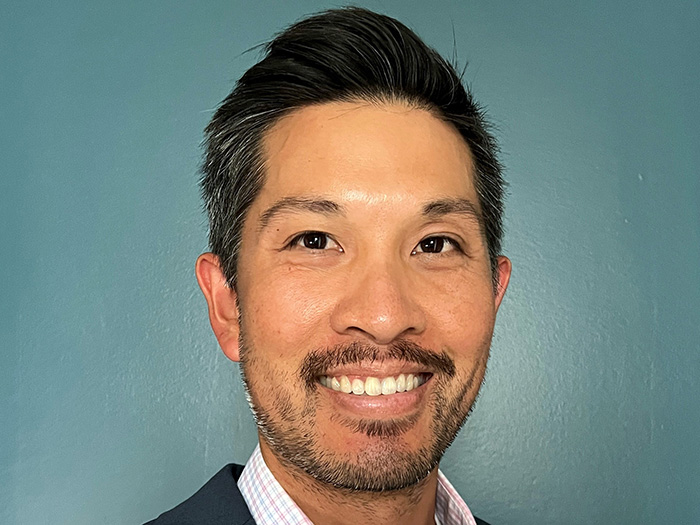Rising Star Derrick Wong Shares How He Keeps Pace with the Ever-Changing Employee Benefits Space


Come see the Stars! As part of our ongoing coverage of the best brokers in the commercial insurance space, Risk & Insurance®, with the sponsorship of Philadelphia Insurance, is expanding its coverage of the Rising Stars, those brokers who represent the next wave of insurance brokering talent.
Look for these expanded profiles on the Risk & Insurance website and in your social media feeds throughout the year.
Here’s our conversation with Derrick Wong, employee benefits practice leader, Risk Cooperative, and a 2023 Employee Benefits Power Broker winner.
Risk & Insurance: Can you share your brokering journey with us? What led you into insurance and how did you find yourself in the position you have today?
Derrick Wong: I began my insurance journey at the Paychex Insurance Agency shortly after graduating college during the Great Recession of 2009. I had the privilege of joining their insurance department amid its startup phase and playing an integral part in the agency’s rapid growth and expansion was an incredible learning experience. My initial role was focused on system programming and IT support.
After obtaining my life, accident and health license, I transitioned to client-facing positions, where I managed clientele within small, midsize and large market segments throughout the United States. Increased exposure to all departments within the agency — including sales, IT operations, account management and customer service — afforded me the opportunity to receive a Lean Six Sigma certification in project management. The accreditation process provided me with in-depth knowledge on analyzing, strategizing and implementing process improvements and maximizing efficiencies, and I’ve applied this methodology when consulting with clients and developing comprehensive benefits packages.
In 2019, I joined the Risk Cooperative team as an account executive to lead the account management and retention divisions within the employee benefits practice. Risk Cooperative’s strategic and collaborative approach to risk advisory and benefits consultation was the catalyst for my decision to join the organization. As our benefits division has expanded over the years, I’ve transitioned to the role of employee benefits practice leader, which focuses on new business development, procuring channel partnerships and increasing our firm’s risk and insurance footprint on a national and global scale.
R&I: What’s new in employee benefits? In other words, what trends are you seeing?
DW: Medical inflation hit its peak in 2023, and as health care costs have been steadily rising, employers are pivoting toward innovative strategies to provide quality care for employees while seeking greater control over health care spending.
A funding model that has gained traction over the past year is reference-based pricing, or RBP. This approach sets a maximum allowable amount for certain medical procedures and services based on a reference point, typically Medicare rates. Rather than relying on negotiated rates between the insurer and health care providers, this method establishes a transparent cost-containment pricing structure that focuses on value-based care.
Well-versed broker partners and comprehensive care navigation teams are integral parts to implementing an efficient and sustainable RBP system. When managed correctly, employers typically save up to 30% of their total health care costs on an annual basis.
R&I: There’s been talk of businesses expanding benefits into items beyond the traditional ones we all know, like health care or life insurance. Can you share some of the more unique or new benefits clients are looking into and why?
DW: In today’s highly competitive employee recruitment and retention market, clients are focusing on cultivating a work environment that promotes work-life balance and overall wellbeing.
Despite the appealing nature of unlimited PTO policies, employees still prove to be apprehensive when taking paid time off. Similar to insurance carrier rewards programs that incentivize members to actively participate in wellness activities throughout the year (such as health screenings, annual checkups, blood tests, health webinar sessions etc.), employers are providing incentive rewards to employees who take consecutive days off throughout the year.
For example, a client restructured its unlimited PTO policy to include a cash bonus incentive for employees who take at least five consecutive business days off during the calendar year. These types of unique incentives assist with reducing the risk of burnout and attrition, promote overall wellbeing, bolster the recruitment of key personnel throughout the year and, most importantly, foster a positive work culture among staff members.
R&I: How do you keep yourself on top of the changes going on in both insurance and the employee benefits space?
DW: Forging and building upon strong, strategic partnerships with insurance carrier providers, vendors and even other insurance brokerage firm professionals within employee benefits has exponentially helped keep me updated on the ever-changing health care industry.
Actively participating in conferences, events, speaking engagements and webinars has proven to be a fundamental tool when creating powerful centers of influence within the employee benefits space. Collaborating with like-minded subject matter experts from various professional backgrounds provides a continual pipeline of up-to-date knowledge, which is an invaluable commodity in our line of work, especially when partnering with a client whose market segment is incredibly competitive from an employee recruitment and retention standpoint.
R&I: What advice would you give to young brokers looking to enter the employee benefits space?
DW: I would advise brokers to begin with setting career goals and identifying the skills and knowledge needed to achieve them. This will assist with identifying areas that need professional development. Attending industry workshops, online courses and training programs will help develop those areas of improvement.
Networking events and conferences to meet professionals within a similar field are valuable ways to connect with potential partners and can help expedite one’s career path.
Collaborating with other departments within one’s organization is incredibly crucial to understanding the overall functions of a successful business. Successful brokers and leaders within the insurance industry are typically subject matter experts in a multitude of fields.
Don’t be afraid to discuss career aspirations and professional development opportunities with a manager or mentor. These individuals are leaders for a reason, and their vast experience and knowledge within the insurance industry are tools that are readily available for career development. &










